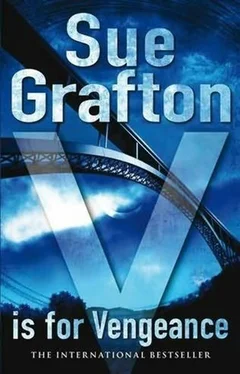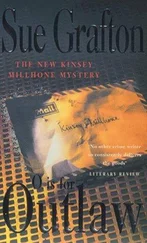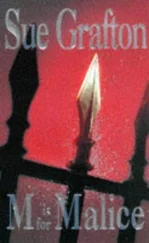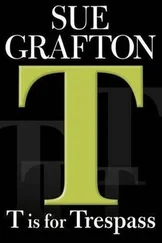She squinted and tilted her head. “What’s that on the right side of the bumper?”
As the car came up the ramp, she stopped the picture midframe. There was a bumper sticker affixed to the right-hand side. I got up and peered more closely, but the picture seemed to dissolve. Both Maria and I backed up halfway across the width of the office space.
She smiled. “That should help.”
“Can you read that?” I asked.
“Sure. You ought to get your eyes checked. Says, ‘My daughter is on the honor roll at Climping Academy.’”
“Oh, wow. That’s great!”
“Right. All you have to do now is find the car.”
“I’ve tackled tougher jobs in my day.”
“I’ll bet. Keep me posted. I want to hear how this turns out.”
Running surveillance is an exercise in ingenuity. As a rule, sitting in a parked car for an extended period generates public uneasiness, especially in a school zone where parents are fretful about abductions, kidnap for ransom, and other forms of child-oriented mischief. Horton Ravine is a natural habitat for wealthy people with expensive tastes. There might be a hundred black Mercedes sedans passing back and forth through the front and rear gates. With roughly eight hundred private homes spread over eighteen hundred acres, my only hope of spotting the car was to find an observation post and wait.
After a quick drive through the area, I decided the obvious location was at the foot of the private drive leading up the hill to Climping Academy. I had to take into consideration that the woman’s bumper sticker might be out of date. Her daughter might have already graduated from Climping. She might have dropped out or transferred to another school. Even if she were currently enrolled, her dad might be in charge of dropoff and pickup, using another vehicle altogether.
Meanwhile, I had to come up with a reasonable explanation for my presence on the road where I intended to keep watch. For short stints, the appearance of car trouble will sometimes work. With the hood up, a puzzled look on my face, and my owner’s manual in hand, I can stall for an hour unless a Good Samaritan comes to my aid. This happens with annoying frequency when I’m least desirous of the help.
Devious creature that I am, an idea occurred to me almost instantly. I left Horton Ravine and took the 101 to a strip mall in Colgate, where I’d seen a large craft mart two doors down from an office-supply store. In the latter, I bought a handheld tally counter, a device that advances one number with each click of a button. At the craft shop, I bought two pieces of heavy-duty poster board, thirty-six inches square, and ten packets of self-adhesive black alphabet letters, with a bonus packet of most-often-used vowels and consonants.
I went home with my packages and set to work on my kitchen counter. With the poster board and stick-on alphabet, I fashioned a sandwich-board sign, hinged at the top, with the same message visible on both the front flap and the back. When I finished the job, I leaned the sign against the wall and climbed the spiral stairs. I sorted through the hanging clothes in my closet and took out my generic uniform, an outfit I’d designed myself and had made many years before. The pants and matching shirt were constructed of a sturdy, no-nonsense dark blue twill, complete with brass buttons, epaulettes, and belt loops through which I can thread a wide black leather belt. On each sleeve I’d sewn a round patch with SANTA TERESA SERVICES embroidered in gold. In the center of the patch there was a vaguely governmental emblem. If I wore clunky black lace-up oxfords and carried a clipboard, I could easily pass for a city or county employee.
I hung the uniform on a peg, ready for my next day’s work. It was almost 5:00 by then, time, I thought, to check in with Henry back in Michigan. I hadn’t talked to him since Monday, and I felt a twinge of guilt that poor Nell and her broken hip hadn’t even crossed my mind. I sat down at my desk and punched in the Michigan number, mentally composing a summary of what had transpired over the past couple of days. The number rang five times and just when I thought the machine would kick in, Henry’s brother Charlie picked up. “Pitts. This is Charlie. You’ll have to speak up. I’m deaf as a post.”
I raised my voice. “Charlie? This is Kinsey. Out in California.”
“Who?”
“KINSEY. HENRY’S CALIFORNIA NEIGHBOR. IS HE THERE?”
“Who?”
“HENRY.”
“Oh. Hang on.”
I could hear muffled conversation and then Henry took the handset, saying, “This is Henry.”
Once we sorted out who was who, Henry brought me up to speed on Nell’s condition. “She’s fine. She’s tough as nails and never a word of complaint.” He said she’d be in a residential rehab facility for another ten days. They’d come up with a pain-management plan to help her tolerate the physical therapy sessions twice a day. Meanwhile, Henry, Charlie, and Lewis spent the better part of the day with her, playing board games to keep her mind off her infirmity. As soon as she mastered her walker, she’d be allowed to come home. “How’s your shin?” he asked.
I pulled up the leg of my jeans and had a look, as though he could see it as well. “More blue than purple and my palm’s just about healed.”
“Well, that’s good. Everything else okay?”
I filled him in on the latest developments, including Marvin Striker’s hiring me to look into Audrey’s death, my trip to San Luis Obispo, and my theory about her involvement in organized retail crime.
Henry was properly sympathetic, mystified, and outraged depending on what part of the story I was telling him, and he asked enough pertinent questions to fill in the blanks. “I’d offer to help, but there’s not much I can do at this remove,” he said.
“Actually, there is. I need to borrow your station wagon for a day or two.”
“No problem. You know where I keep the keys.”
On we went in this fashion and when we finally said our good-byes, I realized we’d been on the phone for forty-five minutes.
As usual, I was starving to death, so I grabbed my shoulder bag and a jacket, locked my door, and trotted up the street to Rosie’s. Claudia Rines was sitting at a table near the door. She had a drink in front of her, grapefruit juice by the look of it, probably laced with vodka.
I said, “Hey, how are you?”
“Fine. I feel like I haven’t talked to you in weeks.”
“It’s been five days, but I know what you mean. You’re meeting Drew?”
“As soon as he takes his break. Are you up for a drink?”
“I’d love one, but just until he arrives. I don’t want to horn in on your dinner plans. Is that vodka and grapefruit juice?”
“It is. William brought in fresh-squeezed juice just for me. You ought to try it.”
“Hang on,” I said. We both turned to catch William’s eye. Claudia held her drink up, indicating she needed a refill. I pointed to myself and held up two fingers. He nodded and leaned down to open the small refrigerator under the bar.
I turned back to Claudia. “So what’s up?”
“Too bad you weren’t here sooner. You just missed a friend of yours.”
“Sorry to hear that. Who?”
“Diana somebody. She works for the local paper.”
“You’re kidding me. When was this?”
“I don’t know, maybe fifteen minutes ago. She came in shortly after I did and introduced herself. She said she didn’t want to be a bother, but she had a few questions about my encounter with Audrey Vance.”
“How did she know who you were?”
“I thought you told her.”
“I never said a word.”
“That’s odd. She knew I worked at Nordstrom’s and she knew I was there when Audrey was arrested. She said she was fact-checking a few items her editor wanted confirmed. I just assumed she’d spoken to you first and was filling in the holes.”
Читать дальше












